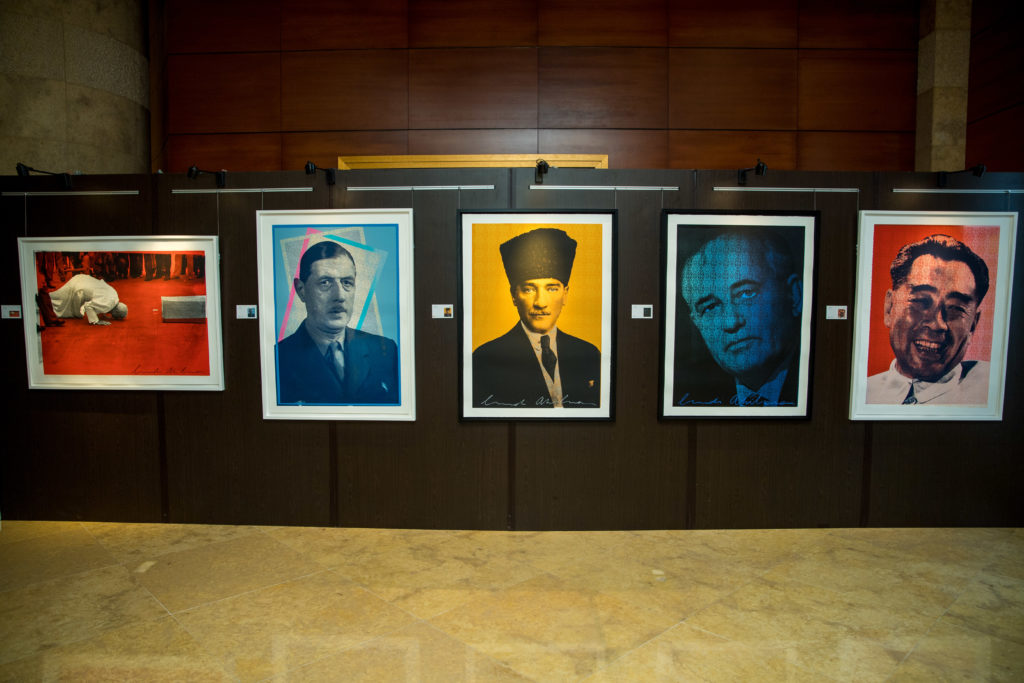NUS Medicine announced that Assaad W. Razzouk, NUS Medicine International Council member, hosted and curated an art exhibition at the East Garden Gallery of the Fullerton Hotel from 3 to 8 September, featuring Lebanese artist Laudi Abilama’s new series especially created for this event, “Transformational Leaders.” The net proceeds from the sale of the artworks will be donated to research on ageing at NUS Medicine with the goal of raising SGD $500,000 to support NUS Medicine’s important and leading research in the field of ageing and ageing-related diseases.

I am not afraid of an army of lions led by a sheep; I am afraid of an army of sheep led by a lion. – Alexander the Great
SEPTEMBER 2018: The National University of Singapore Yong Loo Lin School of Medicine (“NUS Medicine”) announced that Assaad W. Razzouk, NUS Medicine International Council member, hosted and curated an art exhibition at the East Garden Gallery of the Fullerton Hotel from 3 to 8 September, featuring Lebanese artist Laudi Abilama’s new series especially created for this event, “Transformational Leaders.” The net proceeds from the sale of the artworks will be donated to research on ageing at NUS Medicine with the goal of raising SGD $500,000 to support NUS Medicine’s important and leading research in the field of ageing and ageing-related diseases.
About the Artist
Laudi Abilama, a Lebanese artist, is focused on people and personalities, commenting on events and circumstances that have at some point influenced or touched her. Working from her studio in Broummana, a Lebanese town in Mount Lebanon, she uses a screen printing technique (a stencil method of print making in which a design is imposed) on paper and linen. She mixes her own pigment and forces it into the mesh openings by the fill blade or squeegee and onto the printing surface during the squeegee stroke, printing one colour at a time, which makes each piece unique and not duplicable. Integrated into her images are subtle, spontaneous, un-calculated traces of oriental forms, created much in the same way they were hundreds of years ago. She exhibited in Lebanon, England, the UAE, Kuwait and Singapore and her work has been acquired by collectors around the world, and sold at Sotheby’s in London.
The Exhibition
‘Transformational Leaders’ features paintings by artist Laudi Abilama of Lee Kuan Yew, King Hussein of Jordan, Franklin D. Roosevelt, Mahatma Gandhi, Mikhail Gorbachev, King Bhumibol the Great, Charles De Gaulle, Zhou Enlai, Mustapha Kemal Ataturk, John Paul II, Aga Khan IV and Winston Churchill.
About the Curator
Assaad W. Razzouk is a British-Lebanese clean energy entrepreneur and the founder of Sana Gallery, established in 2011 in Singapore. Sana Gallery is Asia’s first Contemporary Middle Eastern Art Gallery. After being nested in the heart of the Spottiswoode Park district during four years, Sana Gallery has now become a Pop-Up Gallery, running curated shows in South-East Asia. Sana Gallery serves as a platform for new images and ideas about the Middle East – presenting exciting Middle Eastern talent to clients and partners in Singapore and South East Asia.
About NUS Medicine and Ageing Research
It is now clear that ageing is the biggest risk factor for a variety of diseases that together deprive life quality as people get older and are increasing health care costs in Singapore (and around the world). In fact, ageing will likely be the single most important medical issue of this century. By finding strategies to slow ageing, it will be possible to keep people healthy and functional longer. NUS Medicine seeks to accomplish this goal through recruitment of experts in the biology of ageing, world class research to understand the ageing process and first-of-their-kind clinical trials to mitigate human ageing and treat age-related diseases such as Alzheimer’s, diabetes, heart disease and cancer. For three millennia, people have been trying to slow ageing and it is now the era where this can be accomplished.
Established in 1905, the NUS Yong Loo Lin School of Medicine is a leading medical educational and research institution in Asia. With 18 departments and two centres, the School covers a full spectrum of medical specialties. Clinical faculty also staff the National University Hospital (NUH), which is the primary training institution for the School’s students. Together with NUH, NUS Medicine has played a profound role in shaping doctors and scientists, who will be future leaders in healthcare, academic medicine and public service in Singapore, Asia and beyond.
The exhibition space has been kindly donated in support of this charitable fund raising by the Fullerton Hotel. The funding for the cocktail reception has been kindly donated in support of this charitable fund raising by Assaad W. Razzouk.
For additional information on the art exhibition or the NUS Medicine International Council, please contact Holman Chin.
